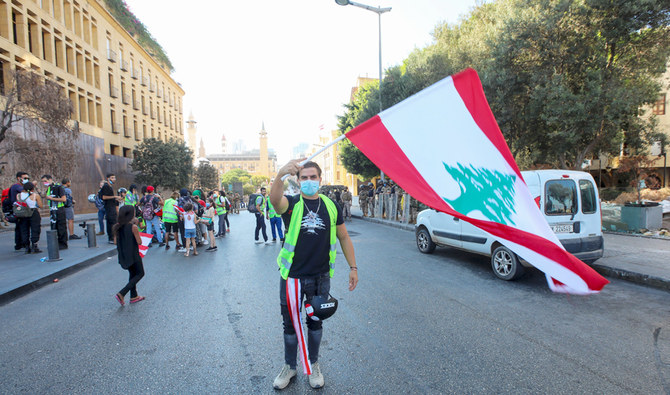
BEIRUT: A Lebanese academic has warned politicians that the country is at risk from the group Hezbollah, despite various factions coming together to try to launch a rescue initiative, as it struggles to resolve a myriad of crises currently affecting the eastern Mediterranean state. There has been no progress yet on the formation of a new government since the collapse of the previous administration in August, and consequently, no negotiations with the International Monetary Fund over a bailout. American economist Steve Hanke said in a tweet on Monday: “While Venezuela continues to hold the top spot in my world inflation table, Lebanon has finally passed Zimbabwe for 2nd place. It’s rather shocking to watch Lebanon’s politicians fiddle, while Beirut burns.” The inflation rate in Lebanon has now reached around 365 percent.
In light of this stalemate, during a press conference at the Palace of Justice in Beirut on Monday, trade unions, universities, economic organizations, labor bodies and civil society forces launched a national rescue initiative under the slogan “Recovering the State,” while joint parliamentary committees will meet on Wednesday to discuss a new electoral law. The head of the Beirut Bar Association, Melhem Khalaf, said in the press conference: “We want to restore the state by reconfiguring the authority to rebuild the country.” Khalaf added: “The initiative is easy to implement and relates to the size of people’s pain, and is open to constructive discussion in a way that reassures all concerns.” The head of the North Bar Association, Mohammed Al-Murad, explained the details of the rescue initiative. He said that the initiative “includes the necessity to form an effective, purposeful, fair and reliable government of independent specialists with specific and limited legislative powers within a specific time frame.” He added: “Government priorities should an endorsement approving the start of implementing a financial, economic and social rescue plan, achieving full justice for the explosion at the Beirut Port and the implementation of a national plan to combat the coronavirus disease pandemic and limit its spread.”
Murad said that the initiative was based on “launching the path of immediate reforms to combat all forms of corruption, auditing all independent institutions and state administrations,” as well as the creation of a Senate and adopting a new electoral law to move the country away from sectarianism. Parliament, meanwhile, is expected to hold a session of the joint parliamentary committees to discuss a controversial electoral bill. Speaker Nabih Berri’s bloc is pressing for the approval of a bill it presented, based on proportional representation, and which treats Lebanon as one constituency. This issue raised concerns from Christian MPs, especially those affiliated with the Free Patriotic Movement and the Lebanese Forces. Edy Maalouf, an MP from the Lebanese Forces bloc, said: “Today, the country does not need such a controversial suggestion.” He spoke of coordination between the Lebanese Forces and the Free Patriotic Movement to “reject the proportional representation bill and treating Lebanon as one constituency.”
Mario Aoun, a Free Patriotic Movement MP, stressed his refusal “to make Lebanon one electoral constituency, although we are in favor of amending the loopholes in the current electoral law based on which the last elections were held and proved its usefulness.” Lebanon’s Deputy Parliament Speaker Elie Ferzli, who will chair the joint committee session, said: “The committees have several electoral bills, and the debate is not limited to one formula. It is better to have a law agreed upon early so that we do not reach the due date without a law.” However, Dr. Mona Fayad, member of the Lebanese Association of Women Researchers, said that the rescue initiative “does not address the issue of illegal weapons outside the constitution, that is, Hezbollah’s weapons.” Fayad told Arab News: “We are a country with its own borders and army. Since 2006, Hezbollah has not fired a single bullet from the south at Israel. Are we supposed to keep its shop open so that it can use it to fight here and there and not close it? Then Hezbollah comes to rule us in the name of the resistance, how can that be possible?” Dr. Fayad added: “How could the rescue initiative ask Parliament to implement the constitution by electing a Senate? Isn’t the current Parliament inherently against the constitution and illegal? And how can elections be held under (the threat of) weapons? “I fear that what is happening now is a mutual collusion process between Parliament and these civilian forces.



